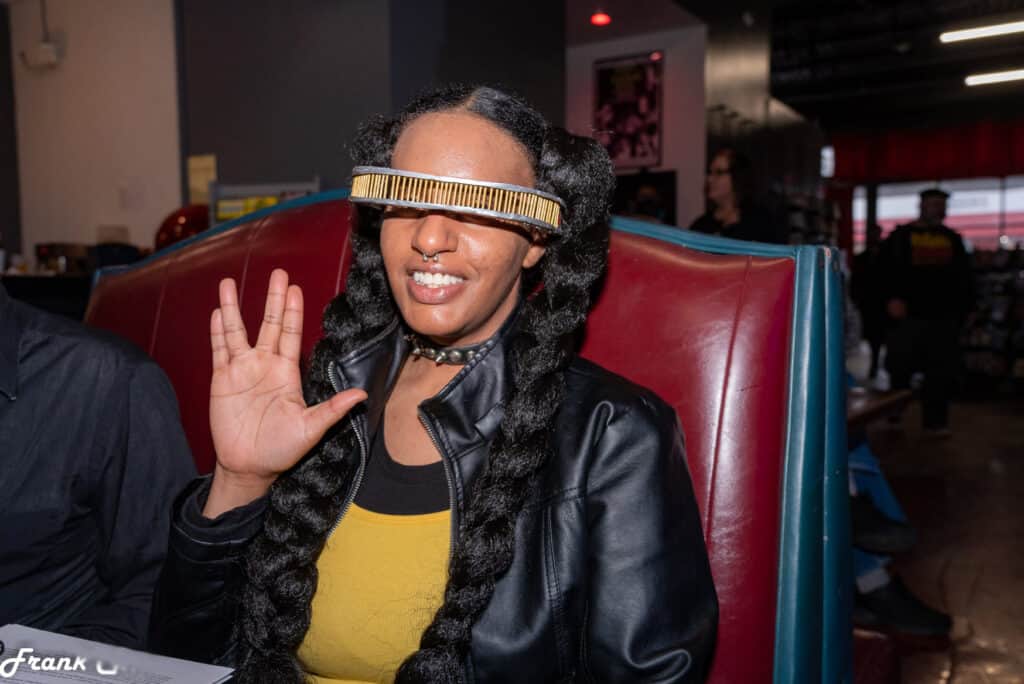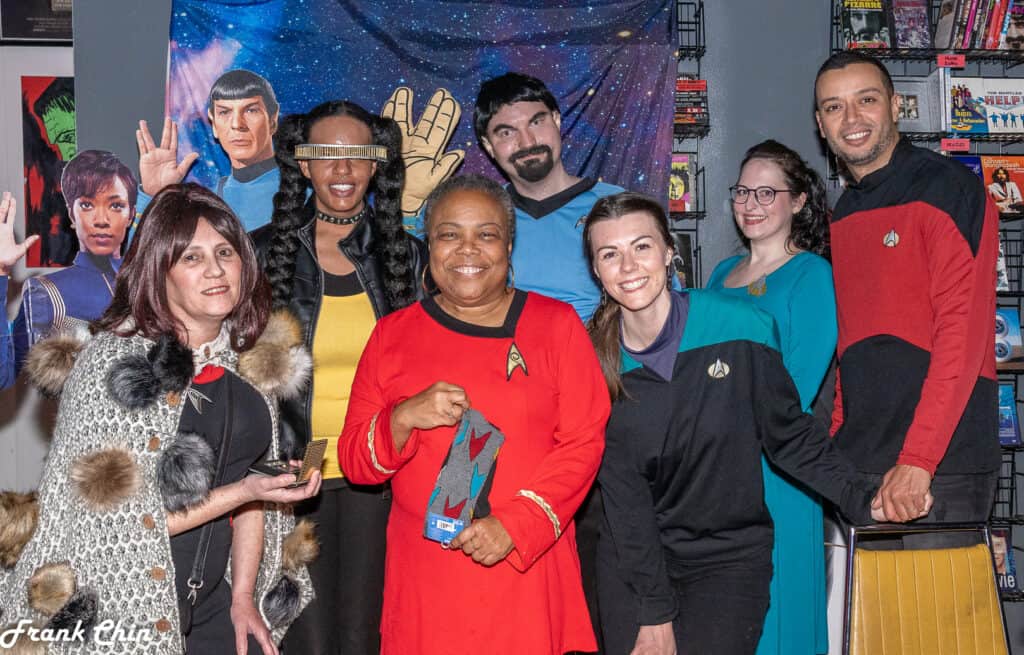by Chellie Bowman | photos by Frank Chin
This is an article where I get to tell you about some really nerdy, really unique stuff happening in Memphis, but I also get to geek out myself, threading together aspects of my personal life and tastes with local community organization and the queer imagination. What could our world be like? What can we learn from a faraway place, a distant future, or an alien race? Why not see what us nerds have to say about it!
Our newly elected DA, Steve Mulroy, has another legacy you might not be aware of, one that orbits around a certain science fiction phenomenon. He’s the man—and the fan— behind Shelby County Star Trek Day, THE only official Star Trek Day in any city or county in the United States! Star Trek Day has already passed this year—it’s April 9th—but a group of Memphians have been celebrating it since it was first declared in 2015. After a two year COVID hiatus, local Trekkies were excited to get together in celebration at Black Lodge earlier this year for such a special day.
I got to sit down and interview one of the organizers (and moderators of the Facebook group—go join!) Siri Eroom about the event and local fandom, and even more importantly, about why Star Trek is uniquely important to the queer community. Although Trek is not perfect (especially older episodes and series) the premise of the show is inherently inclusive and forward- thinking. I speak on that a little myself, as—spoiler alert—I am also a huge Trek devotee.
I had never before been able to actually talk Trek with another fan and that excitement, along with Siri’s vibrant energy, led to such a positive discussion. First, she described all the great things the event had to offer: a super fan panel, engineering & science expert speakers, cosplay contest, canonical Star Trek food (dishes such as the Klingon delicacy Gagh and Ferengi Tube Grubs), trivia contest, vendors, and this year the writer of the original Trek series episode “The Trouble with Tribbles”, David Gerrold made a live remote appearance as well!
Growing up, Siri was introduced to Trek at an early age as her mom used to watch The Next Generation. Later when Voyager premiered, she remembered being excited for the female captain played by Kate Mulgrew. She’s always seen Star Trek as a progressive, hopeful space, even starting back with the Original series in which George Takei and Nichelle Nichols, two minority actors, played leading roles on the bridge of the starship in a time–the 1960s–when that was still very uncommon. Siri voiced that “In every iteration of Star Trek there’s always someone that’s the ‘odd man out’ or a person who doesn’t ‘fit’, but as they go through the series and their character develops, they face trials and tribulations and come through them. And there’s always a parallel to those experiences in real life.” In particular, she points toward the Jadzia character from Deep Space Nine who has, of late, become a queer icon, a character that presents as a young woman but is actually joined with another species called the symbiont, a creature which has inhabited many bodies before, of all genders. They live in symbiosis together and their shared memory and personhood speaks to both trans and non-binary experience.
While Siri is not herself part of the LGBT community, she considers herself a strong ally, something that Trek has always encouraged and cultivated. She expressed that Star Trek teaches the lesson “to fight for everyone; that everyone deserves love and a little bit of light and sunshine in their lives.” Moreover, what she also finds exciting is how the younger audience is growing with the release of the newer Trek shows such as Discovery, Strange New Worlds, and the animated series Lower Decks. These newer series more explicitly represent the LGBTQ community and feature non-binary characters and openly gay relationships.
It really IS exciting. I’ve personally been a fan for many years now, starting out with The Next Generation (TNG), and then moving on to Deep Space Nine, Voyager, and more recently Enterprise and Discovery. (Still, I guess I’m what you would call a late bloomer since I didn’t come around to the show until my late 20’s. But surely the queer community will forgive me, as we are very well-versed with such phenomena. It just takes some of us longer to figure it out, okay!) I’ve also been meaning to start Picard as well, which picks back up the characters and narratives from TNG and other Trek universes around that same timeline. While it hasn’t gotten very good reviews from fans, the character Seven of Nine, a former Borg drone from the Voyager series, is apparently in a gay relationship in it, so I’m in. That’s all it takes, two women kissing on screen.


The narratives and characters from Star Trek may be from the future or about an alien race, but, don’t forget, they were written by us, humble humans, in the recent past and now. These stories are hopeful; they portray a society and a world that could be—one of tolerance, integrity, abundance, diversity, and equality. In fact, just yesterday I rewatched the last episode of TNG Season 1 called “The Neutral Zone” in which the crew of the Enterprise rescue three “ancient” humans from cryogenic stasis in a damaged space capsule. The humans had been frozen just at the end of the 20th century, and were shocked to find themselves in the 24th aboard a starship once they thawed. Among the three humans is a wealthy man who had himself frozen right after he died in hopes that his heart condition would be curable in the future. He’s what you might call a stereotypical capitalist—a businessman whose entire identity is wrapped up in making and hoarding wealth. He is assured that his law firm is still operating, that a pile of money is waiting for him. He demands to see the man in charge (the captain)! He demands a phone so that he may call his bank to check on his “substantial portfolio.” He demands a copy of the Wall Street Journal so that he might see how much his investments are worth. However, all of this— banks, law firms, individual wealth—has become completely obsolete by this time in the future.
In a confrontation with this entitled character, after his repeated demands, Captain Picard retorts “A lot has changed in the past 300 years. People are no longer obsessed with the accumulation of things. We’ve eliminated hunger, want, the need for possessions. We’ve grown out of our infancy.” Additionally, earlier in the episode, Commander Riker corrects this man who assumes he has woken aboard an American ship. Riker informs him that this is a Federation ship, that Earth is one of many planets in a United Federation, a federation composed of many different types of humans, species, and cultures. This is one of the first clues we get that hints at what life on Earth looks like in this sci-fi future. Although Star Trek almost exclusively takes place out in space, on planets far away from Earth, the backdrop to the show, the context that makes their space travel and multi-species inclusivity possible, is that capitalism has died. Similarly, our emancipation, our hopeful futures, our chance to inhabit alternative queer lives and stories is tied to our material circumstances. This is my way of telling folks that queer liberation is wrapped up with all of the other injustices that plague our planet— we must fight together. The systems within our society that propagate homophobia align with those that generate and proliferate racism, poverty, ableism, transphobia and all the other inequities that afflict our communities and our planet. How might we work together to dream up a new world, to pave the way, “to go where no-one has gone before”? How might science fiction and our own imagination help us get there?



